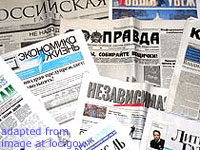Press Digest: Maidan activists release manifesto; Poroshenko profiled

(Russia Beyond the Headlines – rbth.ru – Darya Lyubinskaya, special to RBTH – May 29, 2014)
RBTH presents a selection of views from leading Russian media, featuring U.S. character references of Ukraine’s president-elect Petro Poroshenko, the options open to the new president, and the release of a manifesto by Maidan activists outlining their post-election vision.
Russky Reporter
In an editorial piece, Russky Reporter noted that the winner of the Ukrainian elections Petro Poroshenko “woke up in another country on Monday morning”. According to the publication, he ran his election campaign as if there were no war, and he was “in some virtual Ukraine, where the issues of the Luhansk and Donetsk regions were never on the agenda, and there were only some abstract terrorists and Russian saboteurs there.”
According to Russky Reporter, this was a successful tactical move, thanks to which Poroshenko was elected as a “non-war president”. The unleashing of a needless war against some of his own people, the newspaper writes, using all means of warfare, and even without any attempt to establish contact at the political level – this was not Poroshenko. However, very soon this may well become his policy. “If Petro Poroshenko wants to be president of the real Ukraine, he will have to spend, at the very least, part of his high popularity rating on the peaceful settlement of the tense situation in the Luhansk and Donetsk regions, and heal the Odessa wounds,” emphasizes Russky Reporter.
The publication proposes that Poroshenko should become the “president – a father of a nation”. However, external forces may prevent this from happening, given the presence of “Western, and specifically American, landmines in this political crisis in Ukraine, something that is quite obvious to all impartial observers.” Now Poroshenko, as the former foreign minister, may take advantage of his “peasant, proprietary roots and psychology. In the final analysis, this is now his Ukraine,” Russky Reporter concludes.
Vzglyad
The newspaper Vzglyad reports that protesters camped out on the Maidan in Kiev have refused to dismantle their camp and have vowed to closely follow the work of Petro Poroshenko for one month. Furthermore, the publication writes that Wednesday saw the release of the “Manifesto of Maidan communities about [their] vision of developments after May 2014”. The manifesto states that the Maidan will not disperse until the following requirements are fulfilled: “the punishment of criminals, the lustration [of officials], changes in the system of government, the establishment of constitutional order regarding communities, and the establishment of a Kiev territorial community (in terms of self-government)”. If the president-elect does not fulfill their demands within one month, the protesters on Maidan threaten to implement “public pressure”.
However, the experts of the publication believe that the Maidan was long ago transformed into a “common shantytown” – and no longer, in itself, represents any organized force. “It is fully impossible to understand what these people actually do, and unclear as to what they live for. To say that this is some social stratum that intends to control the government would be an exaggeration,” notes one expert at the publication.
Vzglyad also recalls that Vitali Klitschko, who won the recent mayoral election in Kiev, had previously asked that the barricades be removed from the central square. Klitschko said the Maidan has fulfilled its function, and Kiev must now return to normal everyday life. He also proposed, the newspaper writes, to create, in memory of the victims on the square, a “memorial to those killed in the struggle for a democratic future”.
Kommersant
The newspaper Kommersant, for its part, sifted through documents on WikiLeaks, to see how the American view of Petro Poroshenko kept changing. U.S. President Barack Obama, according to the publication, was one of the first to congratulate Poroshenko on his electoral victory, having expressed a willingness to meet with the president-elect during his upcoming tour in Europe. Kommersant notes that the new Ukrainian leader “is very familiar to the U.S. administration: in WikiLeaks dispatches, he is mentioned exactly 100 times, and some of the evaluations given of him by U.S. diplomats are far from flattering, in terms of his character.”
Most of the negative characterizations shown in data on Petro Poroshenko were written by U.S. diplomats in the years 2006-2009: For example, in one of the dispatches, it was written that: “the image of Poroshenko is discredited by credible allegations of corruption”. In other diplomatic documents, writes Kommersant, Poroshenko was called a “self-disgraced oligarch” and an “extremely unpopular politician, who enjoys broad support from party leaders due to his former business and organizational successes. In addition, the newspaper stresses that in other telegrams from U.S. diplomats, it was indicated that: “Petro Poroshenko, as head of the Ukrainian Ministry of Foreign Affairs, made efforts to ensure that Kiev did not come too close to Moscow”.
Article also appeared at rbth.com/international/2014/05/29/press_digest_maidan_activists_release_manifesto_poroshenko_prof_37035.html
